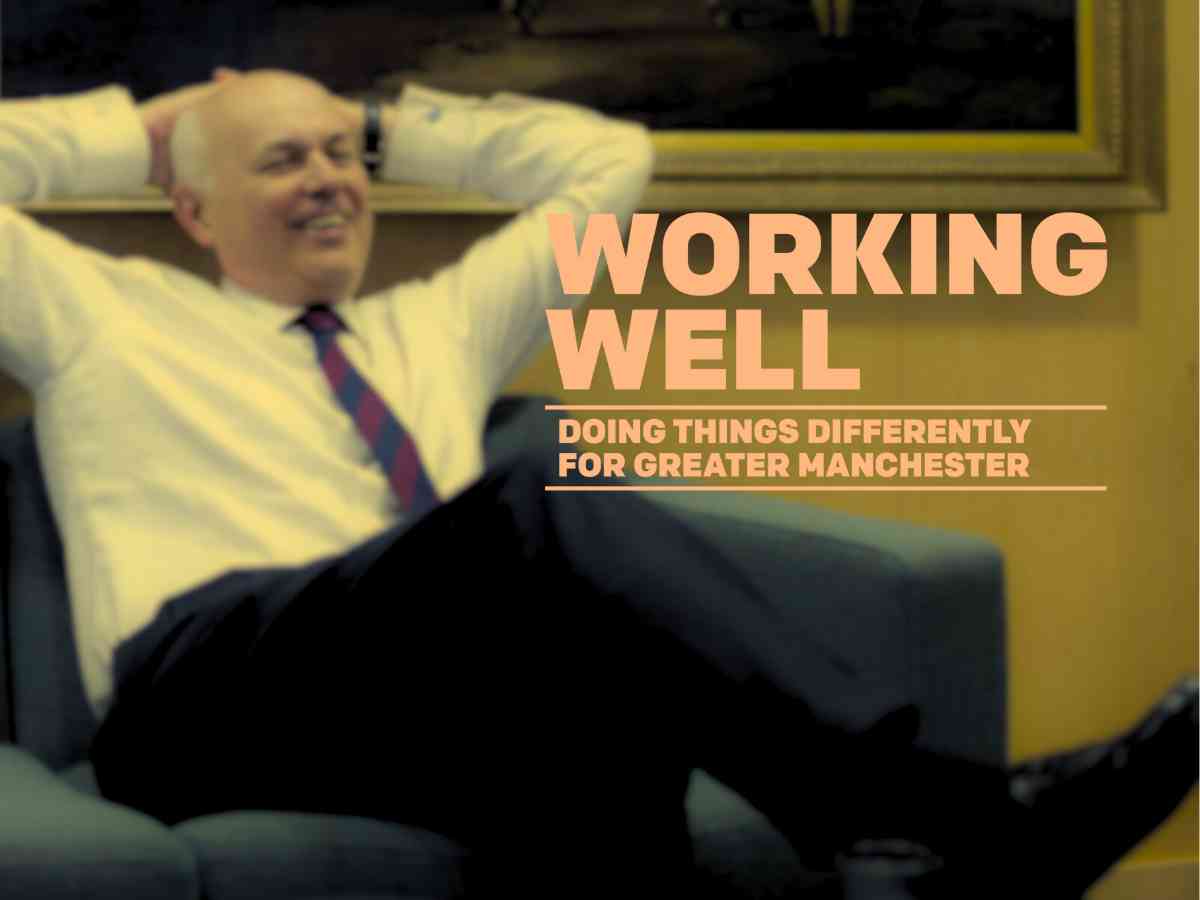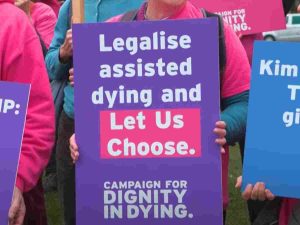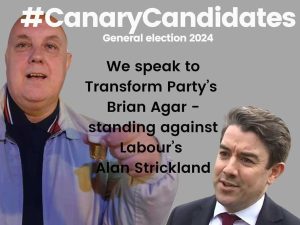A fresh report from the notorious Iain Duncan Smith-founded think tank the Centre for Social Justice has called for the new Labour Party government to expand so-called devolution policies the Tories set in motion at the Department for Work and Pensions (DWP).
In part one of this three article series, the Canary explored the CSJ’s influence over the previous Conservative government, and Labour’s welfare policies while in opposition.
Specifically, the CSJ report touted the success of Greater Manchester’s Working Well programme. Crucially however, the think tank has vaunted this as a model for its potential to do one thing in particular. Unsurprisingly, that is – to save the government money.
A devolved DWP work programme
The CSJ’s report highlighted a £2.68 return on investment to every £1 over ten years which a 2019 evaluation of the programme had estimated. The CSJ report therefore argued that:
The results suggest that not only could devolving employment support be a cost-neutral change in provision, but its success would actually save the Exchequer money over time as people returned to work – potentially billions of pounds if success is replicated nationally
This appeared to apply to an earlier version of the programme – the expansion that the Greater Manchester Combined Authority (GMCA) ran until the end of 2019. By contrast, the GMCA told the Canary that:
cost benefit analysis shows that there is a £1.75 return for every £1 invested.
As such, it too emphasised the CSJ’s assertion that:
The scheme delivered value for money
However, this might be one of only things going for this ostensible work programme. That’s because, besides the return on investment for the government, it didn’t appear to actually help the bulk of the participants into fair-paying and rewarding work.
What’s more, contrary to the regular right-wing rhetoric conflating work with wellbeing, the programme also hasn’t improved the health of the majority of participants who’ve taken part to date. In fact, it may have actually worsened the health of some who engaged with the scheme.
Working Well: Work and Health programme
So, what did the Working Well programme much-lauded and pushed by the CSJ actually achieve? Well, it was hardly the resounding success the CSJ and others have made it out to be. The Canary will focus on the third and ongoing version of the scheme – Working Well: Work and Health programme. This is because there’s more recent data and evaluations for this, with more in-depth analysis than for the pilot and expansion programmes.
Largely, it involved appointments with a key worker, who would primarily refer participants for “support interventions” that were:
delivered in-house, by external organisations within Greater Manchester’s support ecosystem or through access to online resources
In practice then, this largely meant passing participants round to other services. Among the top were GPs – accounting for 10% of referrals, and the government’s National Career Service (NCS) amounting to 7%. Job search sites Indeed and the CV Library came in third and tenth at 6% and 1% of all signposts respectively. The programme also handed participants off to Transport for Greater Manchester in 4% of referrals. Citizen’s Advice also featured in the top organisations. Naturally, the Jobcentre also sat alongside these at 3% of referrals.
In other words, the programme palmed participants off to a range of services they could already access. So, if it seems like a glorified work programme, that’s because it very much is.
However, GMCA argued that:
Everyone who is referred to the Work and Health programme is supported through a dedicated, personalised approach. The programme is designed to act as a one-stop-shop for employment support, connecting people to the right support at the right time, without duplicating existing services. Referrals can be made through different routes, including Jobcentre Plus, primary care, and community organisations.
The programme is just one of many that delivers social, health, and employment support to residents in Greater Manchester. Since 2014 these programmes have supported more than 76,500 people in our city-region and helped 27,500 into jobs, performing strongly when compared to national contracts and despite higher rates of deprivation relative to other areas.
Despite GMCA’s claims, its “one-stop-shop” did make nearly a third of referrals to just these large pre-existing services alone.
In effect, it still meant key workers were telling participants to talk to their GPs about a health problem, or to look online on Indeed for job vacancies, or go to the Jobcentre.
Of course, this begs an important question. That is, what precisely was the point of adding another middleman that sent participants back to the Jobcentre that likely referred them in the first place? Nonetheless, this was largely what Working Well comprised of.
Passing the DWP buck?
There was one community interest company among the organisations – though the evaluation included it twice due to its separate services for physical and mental health. This was Pathways CIC. Its website describes the help it provides to unemployed individuals as including:
advice and guidance on looking for jobs, CV writing, job-keeping skills, job brokerage, employment law, and fast access to treatments including physiotherapy and psychological therapies as well as culturally sensitive services. We also provide services to help people deal with social issues including finances.
Ultimately then, the programme placed the onus of economic inactivity on participants’ own failures. If disabled people couldn’t find an appropriately accessible vacancy in a job market where hundreds are applying to the same role, it’s their own lack of skills, qualification, and CVs to blame. If they’re unable to stay in inaccessible, non-inclusive workplaces, the individual must be doing something wrong. Unable to afford essentials in the spiralling cost of living? Nothing to do with the pitiful poverty pay from employers – it’s on you for your lack of budgeting.
Moreover, the “fast access” to health services implies placing people in the hands of private providers. Essentially, it suggests the programme is giving priority access to healthcare to people seeking work.
Energy supplier SSE also appeared in the top ten organisations the programme referred participants to. In a previous evaluation from 2020, water company United Utilities also featured high in the list of referral organisations. That is, Working Well got individuals to talk to the very private profiteering corporations lumping them with unconscionably unaffordable utility bills in the first place.
A ‘range of services’?
GMCA didn’t directly contest that the programme hadn’t addressed these systemic problems impacting marginalised communities the most. Instead it told the Canary that:
the Working Well programme’s focus is on people’s personal journeys towards and ultimately into work. Societal and workplace barriers are tackled through other work by GMCA.
Different people will have different needs, which may include skills gaps but also health concerns, housing issues, and any other barriers they may face to finding and sustaining employment. The Work and Health Programme recognises these challenges, which is why it takes an integrated approach to providing support.
One example across a decade of delivery is how Working Well has acknowledged unmet need in relation to oral health and employment. Difficulties accessing dental treatment – a national issue – have left people living in pain, embarrassed, feeling judged, and unable to find work. In response, we set up Roots to Dental in collaboration with the NHS University Dental Hospital of Manchester to help people on the programme with quick and easy access to the dental care they need.
The Working Well Work and Health Programme is one of a range of services and is not the only way through which the GMCA works to address societal or structural inequalities.
Largely though, it’s clear the scheme itself has done little, if anything to address the actual societal barriers that exist for chronically ill and disabled people, and those in poverty.
DWP back-to-work results fall short
Not that this fact mattered to the CSJ or the DWP.
That’s because, it all came down to the programme’s results. In short, the number of people it ‘helped’ into work. The problem is however, like countless other DWP work programmes, the scheme failed even on its own terms.
Specifically, it had originally set targets for people starting jobs at a little under three-quarters of participants – 74%. As well as this, it aimed for 47% to achieve what it called its ‘Earnings Outcome’. It determined this as:
Equivalent to working for 16 hours per week for 182 days at the adult rate (aged 25 or over) of the Real Living Wage.
However, by the end of March 2023 it had met just 43% of job starts and 22% of the Earnings Outcome targets overall. But, you wouldn’t know that the programme fell so far short. Why? Because that’s not the story the evaluation is telling.
In fact, the report claimed that the programme has so far met 96% of the job start target. For Earnings Outcome, it stated that it had hit 90% of the target.
Naturally, this required quite the feat of mental maths gymnastics arrive at. And it did this like all great statistics soothsayers – by shifting the goalposts. Before changing these, it was only 58% on target for job starts and just 48% of the Earnings Outcome.
Again however, GMCA contested this, stating that:
It is incorrect to say that the programme is not meeting its targets. Greater Manchester is meeting the delivery targets agreed with central government.
Programmes like this adapt and evolve over time, both at national and local level, in response to changing economic and social challenges. These adjustments have been made throughout the life of the programme, and if people face complex or multiple barriers to employment, they may require more time and support to find employment.
Working Well not keeping people well
Nonetheless, the measure of success for the Working Well WHP revolved almost solely around the rates of unemployed people the scheme has supposedly helped into work.
The government, local authority, and corporate media have had much to say about this – despite these figures. They’ve said less – in fact, practically nothing – about the impacts it may have had on chronically ill and disabled people’s health and wellbeing. This is because in all the impact assessments and evaluations of the various iterations of the programme, none have actually properly explored this.
The closest any of these come to doing so is in the most recent evaluation from 2023. In this, it held a survey of WHP participants’ “perception of their general health”. A similar number of participants reported improvement to the number that reported that their health had worsened while on the scheme – around 4% in each case. Therefore, it noted that there was “ close to no net change”. Overall, the vast majority indicated no change to their health.
Notably however, just 8% of the participants – 732 – actually completed the survey, from the 38% of total participants – 8,878 – who started it. Of course, there’s no information on why so many participants dropped out of the survey.
There could be a number of reasons for this, but one might be that some participants’ health deteriorated to the point where they couldn’t engage. As such, the results are neither a representative, or reliable measure of the scheme’s impact on participant’s health. In short: it’s a strong reminder that work should never be considered a health outcome.
Barriers to work
The Canary put this to GMCA, but it strongly refuted that the no one had evaluated the programme’s impact on participants health and wellbeing. It said that:
This is not correct. All of Greater Manchester’s Working Well programmes are evaluated independently and published on the GMCA website. These evaluations include information on people’s health progression, both before and after participating in the programme.
Moreover, it pointed the Canary to a table in one of the earlier evaluations we’ve accessed in the process of researching for this article. It showed how participants had ranked a range of barriers and whether they reported improvements as a result of the programme. According to this, 76% of clients with severe mental health and 69% with severe physical said this “barrier to work” had improved.
However, there were two major issues with this.
Firstly, the Canary had seen this but felt this did not constitute a proper evaluation of the impacts the scheme had on people’s health. All this shows is that participant’s health as a “barrier to work” had improved, which isn’t the same as saying that person’s health has. Moreover, the data was from a participant’s most recent ‘intermediate assessment’ – which take place every three months. Obviously, this only captures a snapshot and doesn’t look at participant’s health over the long-term or after the programme.
But crucially, the GMCA had signposted us to a table for the ‘Working Well: Expansion’ programme – not the ‘Working Well: Work and Health’ programme we were enquiring about. As such, the data in the table wasn’t actually applicable.
GMCA says…
The Canary contacted the CSJ, GMCA, and the DWP Working Well providers. Only GMCA came back to the allegations.
A spokesperson told the Canary that:
Greater Manchester’s Working Well programmes are designed to provide personalised, dedicated support and advice to people who face complex or multiple barriers to finding work or sustaining employment.
While Working Well helps people to overcome obstacles they face as individuals, we recognise the need to tackle societal and workplace barriers too. For example, through our Good Employment Charter we work with businesses to improve working conditions and access to employment, including promoting the benefits of equality, diversity, and inclusion.
We’re also taking action to address social and economic factors that impact on people’s health and wellbeing, making it harder for them to access education, training and employment. Through our Good Landlord Charter and free Property Check service for renters we will drive up standards in social and private rented housing.
To date the Working Well programmes have been defined at a national level, and Greater Manchester has managed them in accordance with these conditions. We are now setting out our ambitions for more devolved powers and responsibilities over housing, public health, and employment support, so that we can better join the dots between public service provision, work more closely with voluntary sector and community partners, and tackle the structural inequalities that people across our city-region face.
Of course, this practically made the Canary’s point. Specifically, this is that Working Well did operate on the basis of asking individuals to “overcome” barriers. That is, instead of removing these systemic obstacles, the onus is once again on chronically ill and disabled people to deal with them. What’s more, it very well might be the GMCA has other schemes and plans to tackle these barriers – but the fact remains that Working Well has not largely done this.
On top of that, it pointed us to written evidence the GMCA had provided to the Work and Pensions Committee. It outlined a number of achievements from the scheme, highlighting the following:
- Integration with the wider Greater Manchester ecosystem (including referrals to external/other services including health, housing, skills &c.) was 10 times greater that through equivalent national DWP led programmes.
- That despite disproportionately high levels of deprivation, the disproportionate impact of the COVID pandemic, and the doubling of the scale of programmes due to local matched investment, Greater Manchester performed well compared with other DWP provision. The devolved Working Well Work and Health Programme currently ranks 2nd out of the 11 contracts across the country in terms of job outcomes to date for the extension period since November 2022.
The Canary assumes that the GMCA is referring to the DWP’s national Work and Health programmes across the UK. The DWP’s most recent data on this revealed a different story. This showed that in the year up to the end of May 2024, GMCA was ranking third for job outcomes. Overall, it placed much lower than this. Obviously, this calls into question whether the model has really set it apart from other work programmes.
A thin veneer of progressiveness
Even if the GMCA’s devolved DWP scheme had performed better than other national programmes, it still had plenty of shortcomings. One was that nearly 50% of the people who entered employment during the programme left their initial job anyway.
Admittedly, around a third of these did start a second or third job. Despite this, they were far less likely to meet the programme’s so-called ‘Earnings Outcome’. In other words, it indicated that largely these were low-paying, insecure jobs. For instance, 7% of participants ended up in zero hour contracts as a result of the programme.
Ultimately though, this is the model the CSJ is flaunting regardless.
Nevertheless, its thin veneer of progressiveness can’t hide one crucial fact. That is, that its end goal has little, if anything to do with actually helping chronically ill, disabled, and other sidelined groups. In reality, it appears simply a new way of forcing them into the hands of the capitalist workforce. All without ever dealing with the capitalist system disabling and entrenching chronic illness in the first place.
Featured image via the Canary




